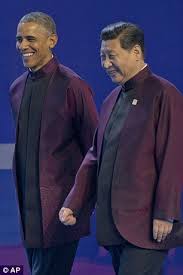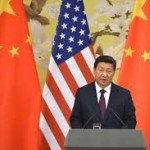The 22nd Asia-Pacific Economic Co-operation (APEC) leaders’ meeting, which was held this year in Beijing, has helped to cement China’s role as a global leader. This will have serious and lasting implications for not only China itself, but for the world at large.
China, the world’s second-largest economy, has put forth a multi-lateral agreement which would help to bolster its role as a regional “leader” and “protector”. The Free Trade Area of the Asia-Pacific (FTAAP) pact, which is backed by China, is said to rival the Trans-Pacific Partnership (TPP) which is backed by the United States and excludes China and Russia. According to Chinese media, the TPP is intended to contain China’s growing might; a claim that US President Barack Obama has vehemently denied, saying that he welcomes a powerful and prosperous China.

Xi and Obama at the Summit. In keeping with tradition at APEC summits, Obama wore an outfit in the style of his host country, but he was mocked for it on US television
Photo: dailymail.co.uk
Currently, the United States is locked into a very competitive relationship with China. The need to manage this dynamic might mean a declining urge to challenge China on the basis of upholding human rights. This could spell trouble for areas like Tibet, Hong Kong, Taiwan, and other regions which count on US support but have been overlooked in favour of pacifying China’s demand that the US not meddle in its internal affairs.
“There is a major risk that China and America become rivals, fighting proxy wars or even direct skirmishes over Chinese control of archipelagos in the western Pacific, and over Chinese conflicts with Japan, the Philippines, Vietnam, or other countries. Yet that seems to me the less likely outcome. In fact, China and America share so many interests – in a stable global economy, in free and open sea lanes for transit of raw materials and manufactures, in maintaining peace in the Asia-Pacific region, and in coping with global environmental threats – that co-operation for the most part is more likely,” said Jack A Goldstone of the Diplomat.
Because the United States is in a weakening position, and because the two countries benefit themselves most by co-operating with one another, it is becoming increasingly unlikely that the US will be in support of smaller powers contending against Chinese incursion.





 Print
Print Email
Email